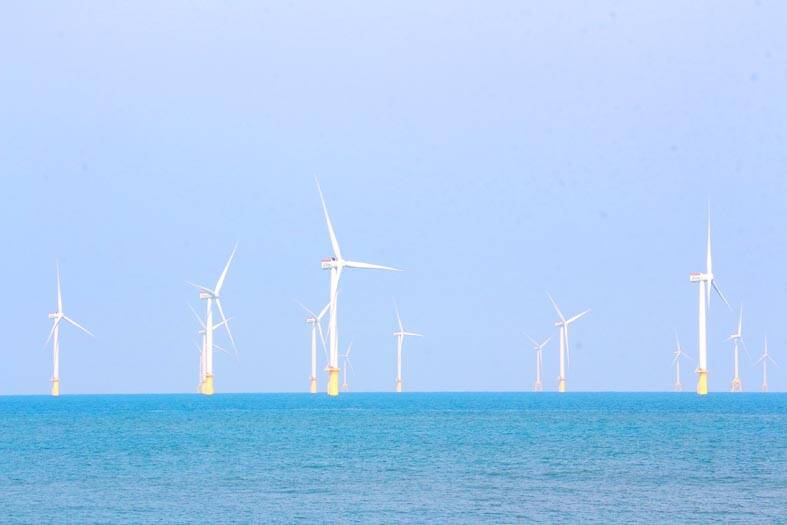Taiwan and Europe on Tuesday voiced their backing for an agreement signed last month to settle a dispute over investment conditions in Taiwan’s offshore wind sector.
The European Commission’s Directorate-General for Trade (DG Trade) said in a statement after the annual EU-Taiwan Trade and Investment Dialogue in Brussels that the two sides “expressed their appreciation for the recently achieved understanding on offshore wind investment conditions.”
The EU also “emphasized the importance of effectively implementing this agreement,” the statement said.

Photo: CNA
That referred to a deal to resolve a dispute at the WTO initiated by the EU in July over Taiwan’s handling of its offshore wind market and specifically its local content requirements for offshore wind projects.
Taiwan agreed to drop localization requirements in future tenders, “either as eligibility conditions or as award criteria,” and committed to introducing greater flexibility “in the way the winning projects from the latest auction are taken forward,” the DG Trade said in a statement on Nov. 8.
At Tuesday’s meeting, the EU also raised its longstanding market access concerns on agri-food exports, while trade, economic security and supply chain issues were also discussed.
The meeting was cochaired by Minister of Economic Affairs J.W. Kuo (郭智輝) and DG Trade Director-General Sabine Weyand, who were also involved in resolving the offshore wind dispute last month.
Kuo is in Europe on a trip that is scheduled to take him to Germany to visit the site where Taiwan Semiconductor Manufacturing Co (台積電) is building a factory and to the Czech Republic to attend the unveiling ceremony of the Taiwan Trade and Investment Center.
Taiwan and the EU have held regular “Economic and Trade Dialogue” meetings since 1981.
Starting in 2022, the EU raised the level of dialogue to the ministerial level for the first time and changed its name to the “Trade and Investment Dialogue.”
Taiwan ranks as the EU’s 13-largest trading partner. Last year, bilateral trade in goods totaled 78.3 billion euros (US$82.1 billion).
The EU maintained its role as Taiwan’s largest foreign investor last year with investments of 2.9 billion euros, of which the majority was concentrated in the offshore wind sector, Tuesday’s statement said.

Taiwan Semiconductor Manufacturing Co (TSMC, 台積電) yesterday said that its investment plan in Arizona is going according to schedule, following a local media report claiming that the company is planning to break ground on its third wafer fab in the US in June. In a statement, TSMC said it does not comment on market speculation, but that its investments in Arizona are proceeding well. TSMC is investing more than US$65 billion in Arizona to build three advanced wafer fabs. The first one has started production using the 4-nanometer (nm) process, while the second one would start mass production using the

When an apartment comes up for rent in Germany’s big cities, hundreds of prospective tenants often queue down the street to view it, but the acute shortage of affordable housing is getting scant attention ahead of today’s snap general election. “Housing is one of the main problems for people, but nobody talks about it, nobody takes it seriously,” said Andreas Ibel, president of Build Europe, an association representing housing developers. Migration and the sluggish economy top the list of voters’ concerns, but analysts say housing policy fails to break through as returns on investment take time to register, making the

‘SILVER LINING’: Although the news caused TSMC to fall on the local market, an analyst said that as tariffs are not set to go into effect until April, there is still time for negotiations US President Donald Trump on Tuesday said that he would likely impose tariffs on semiconductor, automobile and pharmaceutical imports of about 25 percent, with an announcement coming as soon as April 2 in a move that would represent a dramatic widening of the US leader’s trade war. “I probably will tell you that on April 2, but it’ll be in the neighborhood of 25 percent,” Trump told reporters at his Mar-a-Lago club when asked about his plan for auto tariffs. Asked about similar levies on pharmaceutical drugs and semiconductors, the president said that “it’ll be 25 percent and higher, and it’ll

CHIP BOOM: Revenue for the semiconductor industry is set to reach US$1 trillion by 2032, opening up opportunities for the chip pacakging and testing company, it said ASE Technology Holding Co (日月光投控), the world’s largest provider of outsourced semiconductor assembly and test (OSAT) services, yesterday launched a new advanced manufacturing facility in Penang, Malaysia, aiming to meet growing demand for emerging technologies such as generative artificial intelligence (AI) applications. The US$300 million facility is a critical step in expanding ASE’s global footprint, offering an alternative for customers from the US, Europe, Japan, South Korea and China to assemble and test chips outside of Taiwan amid efforts to diversify supply chains. The plant, the company’s fifth in Malaysia, is part of a strategic expansion plan that would more than triple